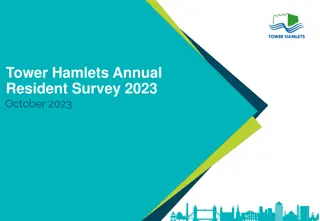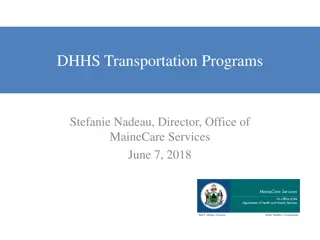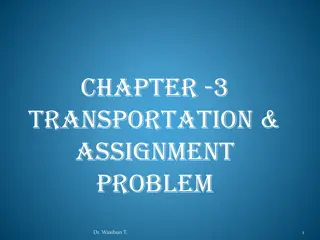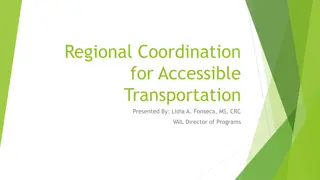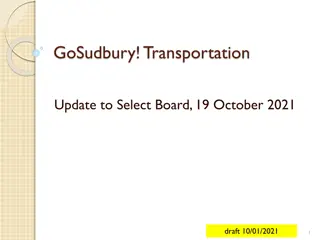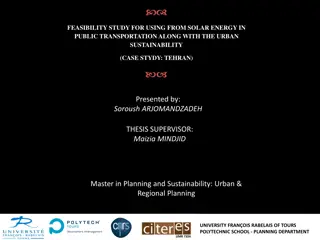Tracking Progress in Transportation Sustainability: NovaTRAC Survey Insights
Delve into the NovaTRAC survey findings presented by Dr. Ahsan Habib at the Transportation Association of Canada Conference. Explore the importance of travel surveys in urban transportation planning, emission modeling for passenger transport, and health indicators linked to transportation behaviors.
Download Presentation

Please find below an Image/Link to download the presentation.
The content on the website is provided AS IS for your information and personal use only. It may not be sold, licensed, or shared on other websites without obtaining consent from the author.If you encounter any issues during the download, it is possible that the publisher has removed the file from their server.
You are allowed to download the files provided on this website for personal or commercial use, subject to the condition that they are used lawfully. All files are the property of their respective owners.
The content on the website is provided AS IS for your information and personal use only. It may not be sold, licensed, or shared on other websites without obtaining consent from the author.
E N D
Presentation Transcript
Tracking Progress in Transportation Sustainability: Nova Scotia Travel Activity (NovaTRAC) survey Dr. Ahsan Habib, Associate Professor School of Planning, and Department of Civil and Resource Engineering, Dalhousie University Session: Best Practices in Urban Transportation Planning Transportation Association of Canada Conference September 24-27 St. John s, NL
Research Links Transportation Environment Health
Travel Surveys Travel surveys are critical for cities to: o develop transport network models o provide information for evidence-based decision making o monitor transportation system performance o track progress in sustainable travel behaviour
NovaTRAC survey About your household o Number and types of vehicles o Number of people living in household o Ownership status and type of house About each person living in your home o Age o Education and Employment o Transit pass ownership 24-Hour Travel Log o Location of Place A and Place B o Reason for making the trip o Start time of the trip o Mode of transportation used
Emission Modeling Fuel Consumption for Passenger Transport per Capita and Total Amount 2015 2016 1203 L per capita 1109.25 millions of L 1204 L per capita 1198.34 millions of L 1 L per capita
Emission Modeling GHG Emissions for Passenger Transport per Capita and Total Amount 2015 2016 GHG 2.987 tonnes per capita 2.75 millions tonnes 3.012 tonnesper capita 2.99 millions tonnes 0.025 tonnes per capita
Health Indicators 2. Happiness 1. Health Status Compared to other people your age, how would you describe your health? Would you describe yourself as usually ? 65% Percentage of Respondents 42% Percentage of Respondents 29% 25% 20% 4% 3% 1% 7% 1% Happy and interested in life Somewhat happy Indifferent Somewhat unhappy Excellent Very Good Good Fair Poor Unhappy with little interest in life 3. Typical Weekdays 4. Physical Activity How would you describe your level of physical activity in a given week? How would you describe a typical weekday? 35% 43% Percentage of Respondents Percentage of Respondents 30% 23% 26% 16% 13% 2% 6% 5% Not at all physically active Not very physically active Very stressful Not very stressful Somewhat stressful Not at all stressful A bit stressful A bit physically active Moderately physically active Very physically active
Age Health Status Happiness 60% 80% 60% 40% 40% 20% 20% 0% 0% 15 to 24 years 25 to 29 years 30 to 34 years 35 to 39 years 40 to 44 years 45 to 49 years 50 to 54 years 55 to 59 years 60 to 64 years 65 and above 15 to 24 years 25 to 29 years 30 to 34 years 35 to 39 years 40 to 44 years 45 to 49 years 50 to 54 years 55 to 59 years 60 to 64 years 65 and above Happy and interested in life Indifferent Unhappy with little interest in life Somewhat happy Somewhat unhappy Excellent Very Good Good Fair Poor Stress in a Typical Weekday Physical Activity 60% 80% 60% 40% 40% 20% 20% 0% 0% 15 to 24 years 25 to 29 years 30 to 34 years 35 to 39 years 40 to 44 years 45 to 49 years 50 to 54 years 55 to 59 years 60 to 64 years 65 and above 15 to 24 years 25 to 29 years 30 to 34 years 35 to 39 years 40 to 44 years 45 to 49 years 50 to 54 years 55 to 59 years 60 to 64 years 65 and above Very physically active Moderately physically active A bit physically active Very stressful Somewhat stressful A bit stressful Not very stressful Not at all stressful Not very physically active Not at all physically active
Income Health Status Happiness 100% 100% 80% 80% 60% 60% 40% 40% 20% 20% 0% 0% Less than $15000 $15000 to $24999 $25000 to $34999 $35000 to $49999 $50000 to $74999 $75000 to $99999 $100000 to $149999 $150000 to $199999 Over $200000 Less than $15000 $15000 to $24999 $25000 to $34999 $35000 to $49999 $50000 to $74999 $75000 to $99999 $100000 to $149999 $150000 to $199999 Over $200000 Excellent Very Good Good Fair Poor Happy and interested in life Somewhat happy Indifferent Somewhat unhappy Unhappy with little interest in life Stress in a Typical Weekday Physical Activity 100% 100% 80% 80% 60% 60% 40% 40% 20% 20% 0% 0% Less than $15000 $15000 to $24999 $25000 to $34999 $35000 to $49999 $50000 to $74999 $75000 to $99999 $100000 to $149999 $150000 to $199999 Over $200000 Less than $15000 $15000 to $24999 $25000 to $34999 $35000 to $49999 $50000 to $74999 $75000 to $99999 $100000 to $149999 $150000 to $199999 Over $200000 Very physically active Moderately physically active A bit physically active Very stressful Somewhat stressful A bit stressful Not very stressful Not at all stressful Not very physically active Not at all physically active
Employment Level Health Status Happiness 60% 100% 80% 40% 60% 40% 20% 20% 0% 0% Full-time Part-time Regular Retired Homemaker Student Unemployed Full-time Part-time Regular Retired Homemaker Student Unemployed volunteer work volunteer work Happy and interested in life Somewhat happy Indifferent Excellent Very Good Good Fair Poor Somewhat unhappy Unhappy with little interest in life Stress in a Typical Weekday Physical Activity 100% 80% 80% 60% 60% 40% 40% 20% 20% 0% 0% Full-time Part-time Regular volunteer work Retired Homemaker Student Unemployed Full-time Part-time Regular volunteer work Retired Homemaker Student Unemployed Very physically active Moderately physically active A bit physically active Very stressful Somewhat stressful A bit stressful Not very stressful Not at all stressful Not very physically active Not at all physically active
Gender Health Status Happiness 60% 80% 60% 40% 40% 20% 20% 0% 0% Male Female Male Female Happy and interested in life Somewhat happy Indifferent Excellent Very Good Good Fair Poor Somewhat unhappy Unhappy with little interest in life Physical Activity Stress in a Typical Weekday 60% 40% 30% 40% 20% 20% 10% 0% 0% Male Female Male Female Very physically active Moderately physically active A bit physically active Very stressful Somewhat stressful A bit stressful Not very stressful Not at all stressful Not very physically active Not at all physically active
Household Size Happiness Health Status 60% 5 or more 4 40% 3 2 20% 1 0% 10% 20% 30% 40% 50% 60% 70% 80% 90% 100% 0% 1 2 3 4 5 or more Happy and interested in life Somewhat happy Indifferent Excellent Very Good Good Fair Poor Somewhat unhappy Unhappy with little interest in life Stress in a Typical Weekday Physical Activity 100% 60% 80% 40% 60% 40% 20% 20% 0% 0% 1 2 3 4 5 or more 1 2 3 4 5 or more Very physically active Moderately physically active A bit physically active Very stressful Somewhat stressful A bit stressful Not very stressful Not at all stressful Not very physically active Not at all physically active
Attitudinal Insights Percentage of Respondents Statements Strongly Agree Agree Neutral Disagree Strongly Disagree I enjoy riding a bicycle 32.2% 29.8% 19.9% 9.3% 8.8% I prefer walking to driving whenever possible 30.5% 33.1% 19.0% 13.4% 4.0% I feel happier when riding a bike 9.6% 14.8% 27.8% 24.5% 23.3% I take pride in owning a car 15.3% 32.5% 31.8% 10.8% 9.6% Driving provides me with freedom 41.0% 41.8% 10.9% 4.7% 1.6% I am fully satisfied with my commute 24.0% 33.7% 20.9% 16.4% 4.8% My commute makes me feel stressed 5.6% 14.1% 22.7% 34.4% 23.3% I am happy with where I live 47.1% 38.1% 8.3% 5.2% 1.4% I invest a lot of time into the community I live in 15.1% 29.2% 32.4% 18.9% 4.5% A suburban environment offers the best quality of life 6.8% 23.1% 29.7% 23.0% 17.4% I limit my driving because it is bad for air quality 8.8% 21.2% 30.3% 32.2% 7.5% I consider global warming a major concern 44.0% 38.0% 14.4% 2.6% 1.1%
Thank You Acknowledgements Funding Agencies: MEOPAR, NSERC-DG, CFI DalTRAC Contributors: Nazmul Arefin Khan and Sara Campbell

